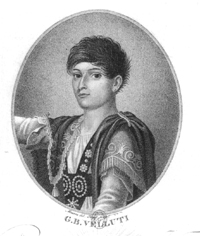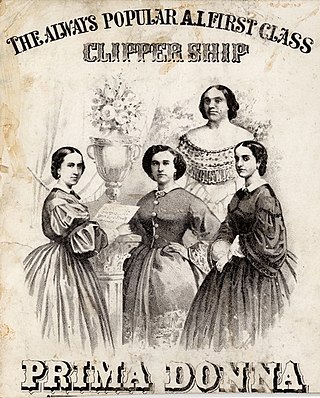Related Research Articles

Maestro is an honorific title of respect. The term is most commonly used in the context of Western classical music and opera, in line with the ubiquitous use of Italian musical terms.
Divertissement is used, in a similar sense to the Italian 'divertimento', for a light piece of music for a small group of players, however the French term has additional meanings.

Giovanni Battista Velluti, colloquially "Giambattista", was an Italian castrato. Considered "the last great castrato", he had a reputation of being something of a diva, with some singers refusing to appear with him.

In opera or commedia dell'arte, a prima donna is the leading female singer in the company, the person to whom the prime roles would be given.
In music, a pasticcio or pastiche is an opera or other musical work composed of works by different composers who may or may not have been working together, or an adaptation or localization of an existing work that is loose, unauthorized, or inauthentic.
Dramma giocoso is a genre of opera common in the mid-18th century. The term is a contraction of dramma giocoso per musica and describes the opera's libretto (text). The genre developed in the Neapolitan opera tradition, mainly through the work of the playwright Carlo Goldoni in Venice. A dramma giocoso characteristically used a grand buffo scene as a dramatic climax at the end of an act. Goldoni's texts always consisted of two long acts with extended finales, followed by a short third act. Composers Baldassare Galuppi, Niccolò Piccinni, and Joseph Haydn set Goldoni's texts to music.

Il crociato in Egitto is an opera in two acts by Giacomo Meyerbeer, with a libretto by Gaetano Rossi. It was first performed at La Fenice theatre, Venice on 7 March 1824. The part of Armando was sung by the famous castrato, Giovanni Battista Velluti; the opera was probably the last written to feature a castrato. It is the last of Meyerbeer's series of operas in Italian, and became the foundation of the composer's international success.
Opéra-ballet is a genre of French Baroque lyric theatre that was most popular during the 18th century, combining elements of opera and ballet, "that grew out of the ballets à entrées of the early seventeenth century". It differed from the more elevated tragédie en musique as practised by Jean-Baptiste Lully in several ways. It contained more dance music than the tragédie, and the plots were not necessarily derived from classical mythology and allowed for the comic elements, which Lully had excluded from the tragédie en musique after Thésée (1675). The opéra-ballet consisted of a prologue followed by a number of self-contained acts, often loosely grouped around a single theme. The individual acts could also be performed independently, in which case they were known as actes de ballet.
In opera and musical theatre, a sitzprobe is a rehearsal where the singers sing with the orchestra, focusing attention on integrating the two groups. It is often the first rehearsal where the orchestra and singers rehearse together. The equivalent Italian term is prova all'italiana.
The French term comédie mêlée d'ariettes was frequently used during the late ancien régime for certain types of opéra comique.
Romantische Oper is a genre of early nineteenth-century German opera, developed not from the German Singspiel of the eighteenth-century but from the opéras comiques of the French Revolution. It offered opportunities for an increasingly important role for the orchestra, and greater dramatic possibilities for reminiscence motifs – phrases that are identified with a place, person or idea and which, when re-used in a work, remind the listener of the place, person or idea in question.
Stagione is an organizational system for presenting opera, often used by large houses. Typically each production is cast separately and has a brief but intensive run of performances. By contrast, companies that use a repertory system maintain a permanent company and rotate productions over many months or even years. Historically the stagione system has been preferred in Britain, the United States, and most large international operahouses.
A dramma per musica is a libretto. The term was used by dramatists in Italy and elsewhere between the mid-17th and mid-19th centuries. In modern times the same meaning of drama for music was conveyed through the Italian Greek-rooted word melodramma. Dramma per musica never meant "drama through music", let alone music drama.
In theater and music history, a burletta is a brief comic opera. In eighteenth-century Italy, a burletta was the comic intermezzo between the acts of an opera seria. The extended work Pergolesi's La serva padrona was also designated a "burletta" at its London premiere in 1758.
Zeitoper was a short-lived genre of opera associated with Weimar Germany. It is not known when or by whom the term was coined, but by 1928 Kurt Weill was able to complain that it was more a slogan than a description. Like opera buffa it used contemporary settings and characters, comic or at least satiric plots and aimed at musical accessibility. Two distinguishing characteristics are a tendency to incorporate modern technology and frequent allusions to popular music, especially jazz. This last, more than any social satire, earned the suspicion of the political right and ensured that it would not survive into the Nazi era.
Baritenor is a portmanteau (blend) of the words "baritone" and "tenor". It is used to describe both baritone and tenor voices. In Webster's Third New International Dictionary it is defined as "a baritone singing voice with virtually a tenor range". However, the term was defined in several late 19th century and early 20th century music dictionaries, such as The American History and Encyclopedia of Music, as "a low tenor voice, almost barytone [sic]."
A duodrama is a theatrical melodrama for two actors or singers, in which the spoken voice is used with a musical accompaniment for heightened dramatic effect. It was popular at the end of the 18th century and the beginning of the 19th.

The Teatro del Fondo is a theatre in Naples, now known as the Teatro Mercadante. It is located on Piazza del Municipio #1, with the front facing the west side of Castel Nuovo and near the Molo (Dock) Siglio. Together with the Teatro San Carlo, it was originally one of the two royal opera houses of the 18th and 19th-century city.
In opera, a banda refers to a musical ensemble which is used in addition to the main orchestra and plays the music which is actually heard by the characters in the opera. A banda sul palco was prominently used in Rossini's Neapolitan operas. Verdi used the term banda to refer to a banda sul palco, as in the score for Rigoletto. He used the term banda interna, to refer to a band which is still separate from the orchestra but heard from the off-stage wings. The early scores of La traviata use a banda interna.
References
- ↑ New Grove Dictionary of Opera, vol 3, p.529, sv "musico"
- ↑ Warrack, John and West, Ewan (1992), The Oxford Dictionary of Opera, 782 pages, ISBN 0-19-869164-5
- ↑ Warrack, John and West, Ewan (1992) op. cit.